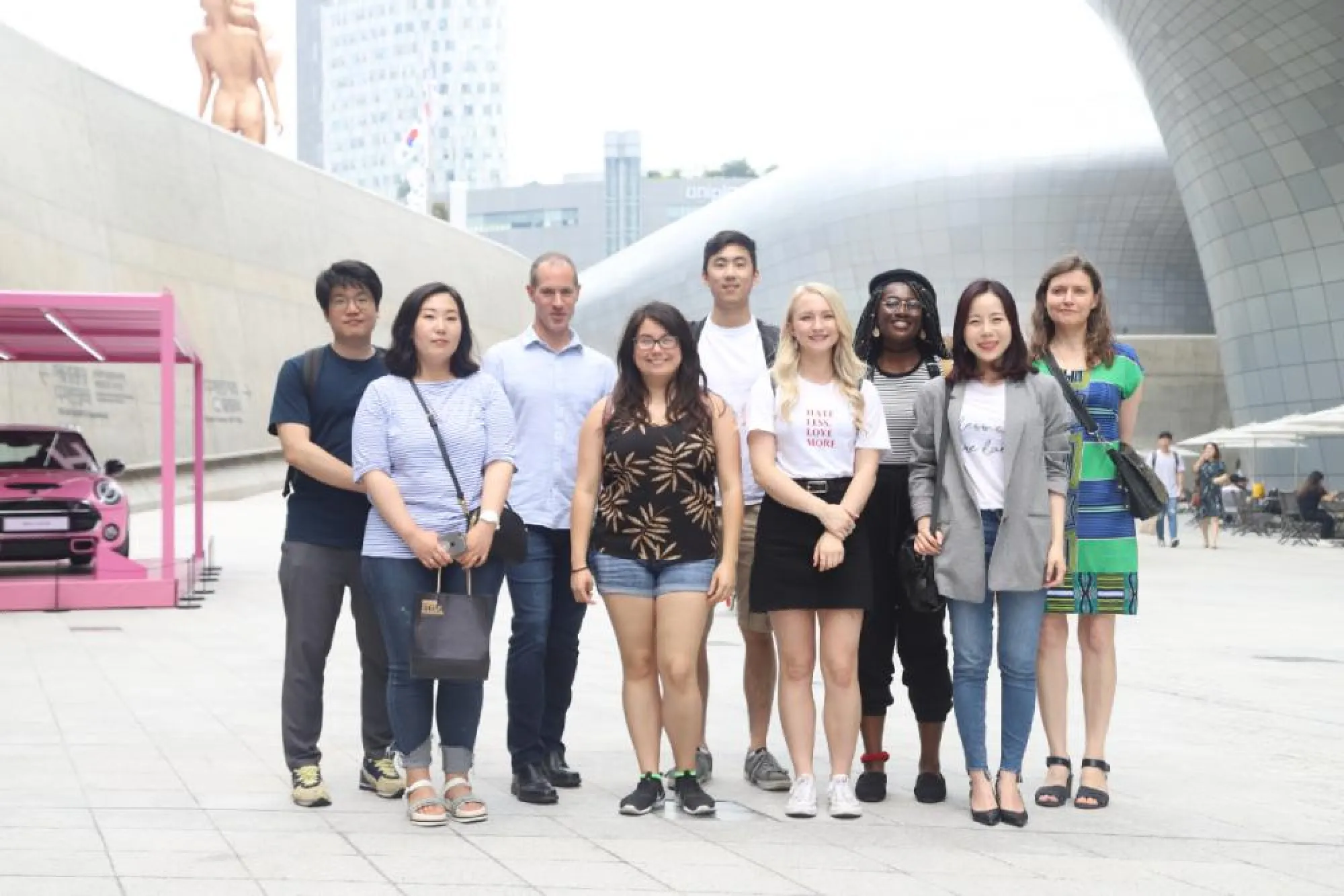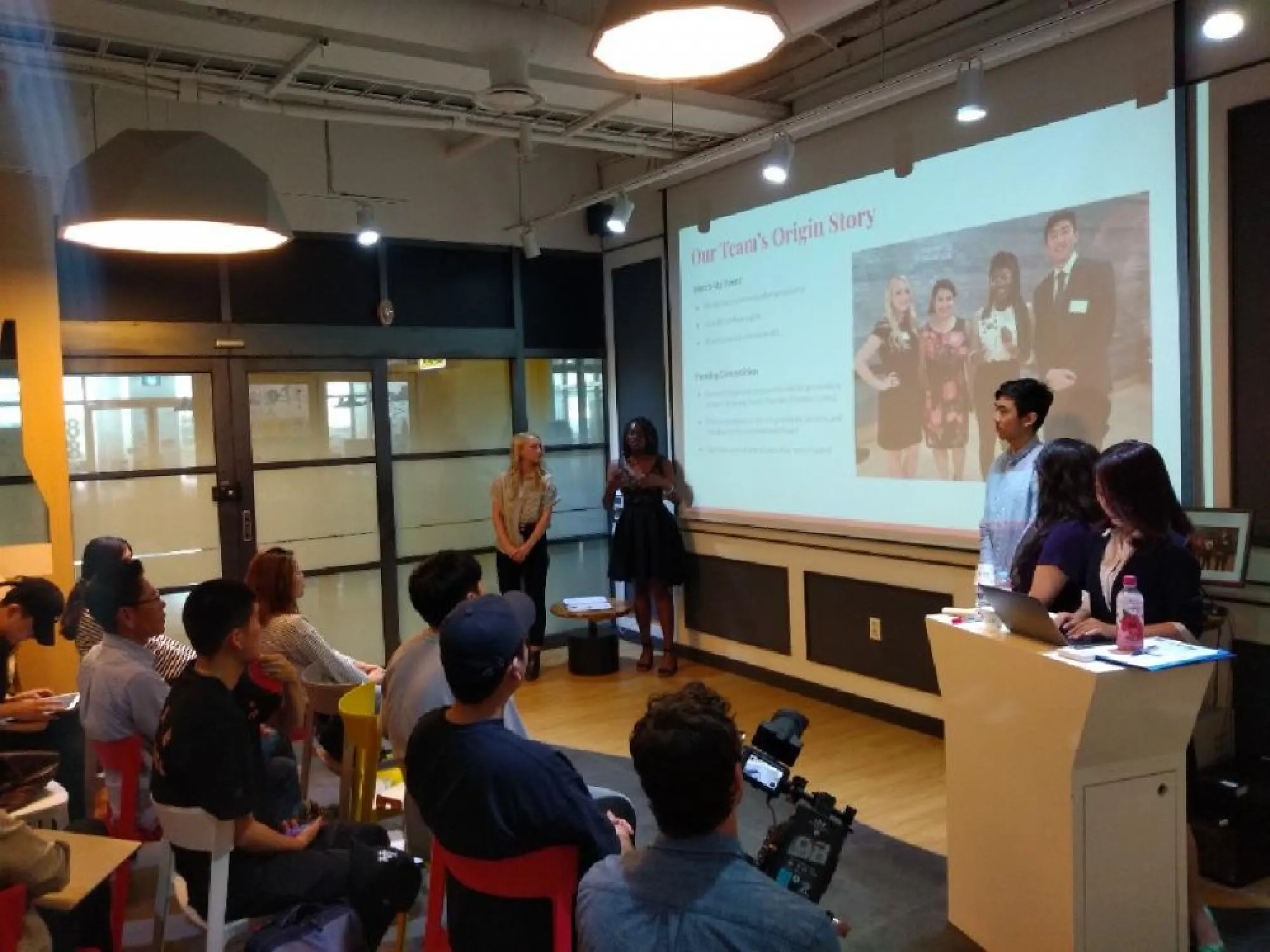A Global Opportunity

Lead by faculty members from the School of Design and Creative Technologies, a team of undergraduates from Natural Sciences and Liberal Arts travels to South Korea for mental health research project
by Alicia Dietrich
When an interdisciplinary team of UT undergraduate students pitched their idea for the President’s Award for Global Learning, they had an ambitious idea: create a mobile phone app to help reduce suicide rates in South Korea.
None of the students had ever been to South Korea, and they would have to learn quickly how to navigate language and cultural differences to complete their project on time. But their yearlong journey in a global laboratory from big idea to finished product led them through many twists and turns they could never have experienced on the UT campus alone.
Following a design process led by a team of faculty advisers from the School of Design and Creative Technologies, these four students gained new approaches to problem-solving and learned invaluable insights and lessons that helped shape their worldviews and future work.
In 2018, President Gregory L. Fenves announced the creation of the President’s Award for Global Learning, a signature program that prepares UT undergraduate students to tackle entrepreneurial, social impact or scholarly research challenges at home and in an interconnected and complex world. Through a competitive process, seven teams of UT students and faculty advisers were selected in fall 2018 to tackle research projects around the globe. Each team received $25,000 to cover project implementation, plus travel costs and academic support. Students enrolled in a spring class to plan and research their projects, and then spent the summer abroad implementing their projects with their teams.
Psychology undergraduate Patience Ojionuka was interested in addressing mental health in young populations in South Korea, which has one of the highest suicide rates among developed countries. Ojionuka first encountered the issue as a high school student when she met exchange students from South Korea who spoke of the highly competitive academic environment. They described going to school during the day and then continuing in private intensive study sessions, or “cram school,” until 11 p.m.
“That was something that always stuck with me,” says Ojionuka. “Anytime I met Korean foreign exchange students, they always validated that experience and confirmed that academia is especially stressful for Korean students.”
When Ojionuka heard about President Fenves’ Award for Global Learning, she knew she wanted to develop a project surrounding that topic. At a networking event, Ojionuka pitched her idea, and Elena Ordoñez (sociology), Shaina Owens (neuroscience) and Andrew Chen (biochemistry) partnered with her to create a team.
The students scrolled through faculty lists to find advisers well-suited to lead a team to South Korea. They hoped to find someone who could help bridge language and cultural barriers, and connected with Assistant Professor of Design Jiwon Park, who was born and raised in Seoul.
And, when their two other faculty sponsors had to withdraw from the project, Park stepped in as the lead and tapped her own network and brought in two of her College of Fine Arts colleagues to round out the team: Arts and Entertainment Technologies Assistant Professor of Practice Michael Baker and Associate Professor of Design Carma Gorman.
Although Gorman acknowledges they could have benefited from having a faculty adviser with credentials in mental health research, the three faculty members from the School of Design and Creative Technologies brought complementary strengths to the team.
“Jiwon Park has a model in her head for what the design process looks like, and I have a model in my head for what the research process looks like, and Michael Baker’s expertise is the game development process,” said Gorman. “Given that we all have plenty of experience working on big creative projects whose outcomes cannot really be predicted at the outset of the process, I think we all trusted that if you follow a good process, you'll likely end up with something decent at the end.”

The team went through two rounds of pitching in front of a panel of judges during the fall of 2018 before they were selected as one of seven teams to receive the award. In the spring of 2019, the team met for class three hours each Wednesday night to dive into their topic and begin to flesh out their project.
"Spring semester was all about connecting dots between the problem of mental health in Korea and their deliverable: a mobile phone app,” says Gorman. “They had to figure out what an app could do to address the problem of mental health and find research and literature that supported that idea."
Initially, the team wanted to target teen suicide rates in South Korea, but after Gorman walked them through the protocols required for doing research on human subjects who are minors, they pivoted to an age group near and dear to their hearts: college students.
The students spent the spring exploring existing research on the efficacy of apps related to mental health and exploring apps already on the market. When the team left for Seoul in early June, they had many ideas for their app, but they still needed to narrow their focus.
“The reality of executing big is such a different ballgame, compared to the dreaming part,” Baker says. “That was huge for these students, and it was key that Jiwon Park was leading the team. She knows exactly what it takes to dream and execute. She was the ideal faculty lead for this whole thing.”
Using her connections in her native city of Seoul, Park had set up a partnership with a class of undergraduate students at Chung-Ang University, and as soon as the UT team arrived in South Korea, they went to work with their Korean counterparts.
Both groups brought many ideas to the table. The UT students were initially inclined toward developing a meditation, mood-tracking and/or self-care app. But once they began working with the Chung-Ang University students, who fell squarely in their target demographic, they found they needed to rethink many of their ideas.
“The Korean students told us that trying to make an app all about mental health might be a little bit too progressive because people there aren't necessarily talking about mental health so openly,” Ojionuka says. “So, while individualist concepts like 'self-care' are gaining popularity abroad, Korean students would not yet feel inclined to download an app about suicide prevention or mental health care.”
That feedback forced the UT team to question many of their assumptions and gave them insight into some of the cultural differences between the two countries that could inform their app concept.
“With almost any student, we can talk in principle about a global context, but it's a very different thing to actually be in it,” says Baker. “To me, that's very interesting. There's a really big difference between getting the concept and really understanding what that's like. It's hugely valuable for everyone.”
The team’s survey and interview results made it clear that Korean college-aged students considered relationships a significant source of stress. However, by “relationships,” Korean college students meant not just romantic relationships, but also relationships with parents, professors, and—crucially—students and co-workers just a year or two older than themselves. In a culture where deference to elders is so fundamental a principle that word endings change to reflect the relative ages of speaker and addressee, older students often haze, bully or boss younger ones. And because younger students have no socially acceptable way to protest this treatment, they sometimes develop debilitating anxiety and depression.
Using that insight, the team created Riary, an app that tracks feelings associated with relationships. (The name is a play on “Relationship” and “Diary.”)
“It's akin to mood tracking, but instead of just tracking your mood, you're tracking who these moods, feelings and emotions happen with,” Ojionuka says. “So, if you spend time with someone frequently and notice that your mood always takes a dip afterwards, then maybe that relationship isn't the healthiest.”
With guidance and oversight from the faculty, the team spent the final month in South Korea designing an interface for the app and creating and cataloging all the assets that the developers would need to build the product. The app is now completed and available for free download on Android devices, the most commonly used mobile phone operating system in South Korea (where Samsung reigns supreme).
Upon returning to campus, students enrolled in a one-credit course for the fall to prepare a presentation and final report about their project and what they learned from the experience.

“Personally, I've grown a lot in many ways. I feel like my ability to adapt has really changed,” Ordoñez says. “Before, I had always been a problem solver, always had been able to move forward past problems that arise. But in this context, it was really fast-paced, and our ideas evolved so much so quickly. I feel like this is more at the level of the real world than trying to problem-solve in an educational context where you're more sheltered. This felt like a job.”
Looking back, the faculty members say they found the opportunity to participate in the program hugely rewarding and personally enriching, but they were even more excited to see the growth of the students during their journey on the project.
“The benefit of participating in this program is just enormous for students,” says Baker. “These students are forever changed for the better. To be part of that, that's a dream. I'm grateful to have been involved.”
Explore the Riary app






